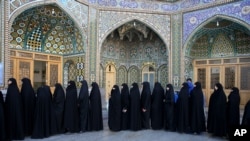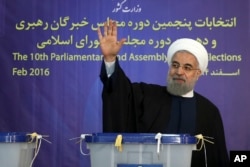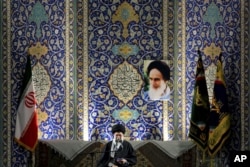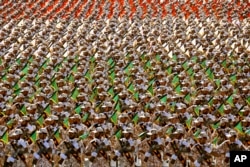Election hours in Iran were extended Friday in a vote for a new parliament and Assembly of Experts, the first test of public opinion since Iran signed onto an international nuclear deal. Careful vetting of candidates by religious authorities means reformists are unlikely to realize the win that President Hassan Rouhani had hoped for. What, then, is the fate of the nuclear deal and the president’s efforts to open the economy?
A prevailing narrative paints Rouhani as a lone, liberal visionary pitted against hardline clerics opposed to both the deal and opening up the economy. But the truth, said Alireza Nader, an international policy analyst at the Rand Corporation, is far less dramatic.
“First, I think it’s important to note that Rouhani is not a reformist,” Nader said. “He has never called himself a reformist.”
Indeed, in 1999, Rouhani took a tough stand against student demonstrators. A year later, when former U.S. Secretary of State Madeleine Albright suggested opening a new chapter in U.S. relations with Iran, Rouhani called her statement “repugnant and unacceptable.”
“During the last two-and-a-half years that Rouhani has been president, he has not enacted any major reforms in Iran -- or even minor reforms for that matter,” said Nader. “It’s either due to the fact that he does not have the will or the capability.”
Nuke deal will stand
Some reports have cast doubts on the future of the nuclear deal, worried that hardliners could work to derail it.
“That’s not really at play here,” said Patrick Clawson, research director at the Washington Institute for Near East Policy. "The nuclear deal represents a plus for Iran because Iran got some sanctions relief and got access to a whole lot of money in return."
Some argue Rouhani would never have gotten the nuclear deal had Supreme Leader Ayatollah Ali Khamenei really opposed it.
“Rouhani and his ministers managed to convince the Supreme Leader, saying, ‘Look: The economic sanctions have paralyzed the economy, and if you are concerned about the well-being of the system, after all, this is a pill that you need to swallow,’” said Mehrzad Boroujerdi, professor and chair of the political science department at Syracuse University’s Maxwell School of Citizenship and Public Affairs.
Further, he said, Khamenei was intimately involved in the negotiating process.
“He set red lines for the negotiating team and the like. So he cannot really now disown the nuclear deal,” he said.
Revolutionary Guards stand to profit
But the Supreme Leader isn’t the only power in Iran. The Islamic Revolutionary Guard Corps (IRGC) is so strong that academics, according to Boroujerdi, often debate who’s really in charge in Tehran.
Created by the former Ayatollah in 1979, the IRGC’s job is to safeguard the Republic from internal and external threats. In return for their support, they have been rewarded with lucrative business contracts and key leadership posts. They are today what one of their own founding members calls a combination “Communist Party, KGB, a business complex and the mafia.”
They have a big stake in Iran’s nuclear and weapons programs, but analysts say it’s doubtful they’ll work against the nuclear agreement. At least one observer has suggested that the IRGC may have actively sought the deal and supported 2012 secret talks between the U.S. and Iran in Oman.
The IRGC controls a huge chunk of the economy – from oil and natural gas to agriculture, mining, transportation, telecommunications, banking and more. They are also believed to run a flourishing smuggling and black market trade that has flourished in the face of sanctions.
“The IRGC are worried that Rouhani wants to open up Iran economically as well as politically and culturally. And the guards have amassed so much economic power that some of the monopolies that they have established over the economy could be jeopardized if Iran opens up to the West,” said Rand’s Nader.
But Boroujerdi chuckles at the notion.
“These guys sit handsomely and they will benefit whether Iran’s economy is closed or open. In other words, if it’s closed, smuggling allows them to make a killing,” he said. “And if it’s open, these guys will put on three-piece suits and will be the first ones negotiating with you from the other side of the table.”










